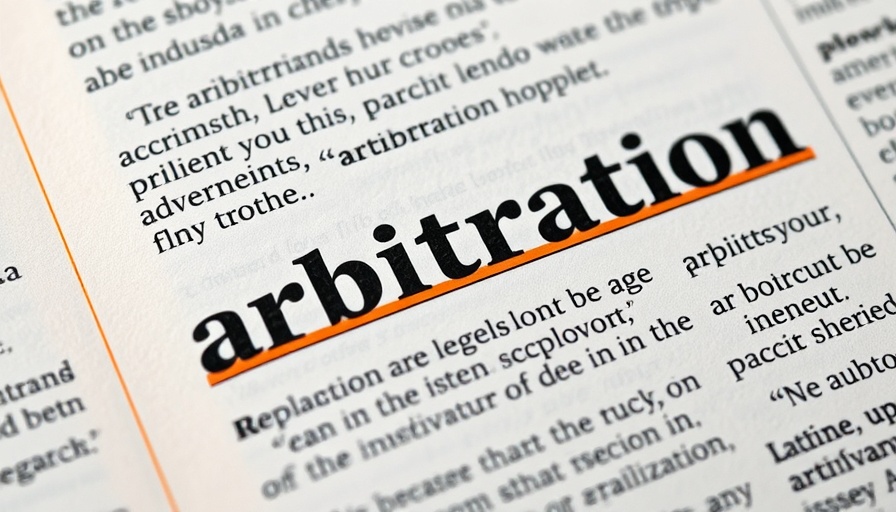
The Truth Behind Insurance Arbitration: An Inequitable Process?
For many residents of South Carolina, navigating the maze of insurance claims can be daunting, especially when faced with the complex world of arbitration. Arbitration is witnessing a resurgence in the insurance sector, dating back to its introduction in the 19th century. However, unlike its intent to streamline resolutions, current practices reveal that it often transforms into a mimicked courtroom process, primarily benefiting insurance companies.
What Is Arbitration and How Does It Work?
Arbitration refers to a method of dispute resolution where a neutral third party makes a binding decision after hearing evidence from both sides. Traditionally seen as a quicker and less costly alternative to litigation, arbitration's efficacy comes into question when examining modern insurance practices. In many cases, arbitration clauses are vague, failing to outline the rules that will govern them. This ambiguity can lead to a process burdened with excessive procedural formalities, essentially turning arbitration into a form of litigation without juries.
The Bias in Current Arbitration Practices
One of the critical issues with insurance arbitration is that it tends to favor insurers rather than insureds. Most arbitrators, often lawyers or retired judges, recreate a courtroom environment rather than an informal resolution venue. This results in extensive investigation and evidence collection that was never supposed to be a part of arbitration. Consequently, the intended efficiencies are lost, with many policyholders finding themselves entangled in lengthy, drawn-out disputes that mirror traditional litigation.
The Role of the Federal Arbitration Act (FAA)
The FAA, introduced by Congress in 1925, protects the enforceability of arbitration agreements. However, it does not dictate how the actual arbitration should proceed. This procedural gap means contracts often lack necessary details, leaving considerable room for interpretation. These clauses rarely define the governing rules, creating an environment ripe for potential manipulation by insurers who might leverage this ambiguity to their advantage.
The Need for Procedural Discipline in Arbitration
To combat the pitfalls of arbitration, a call for procedural discipline is necessary. Policyholders and their advocates must insist on clearer guidelines that emphasize efficiency, focus, and fairness. A proper arbitration should entail:
- Statement of Claim: Clearly defined causes of loss and coverage disputes.
- Focused Discovery: Limited to essential issues only.
- Expert Involvement: Allowing expert opinions to support positions.
- Efficient Proceedings: Ensuring quick hearings with predetermined timelines.
By enforcing these changes, the arbitration process can better serve policyholders rather than becoming a mere replication of the traditional judicial system.
Common Misconceptions About Insurance Arbitration
Many policyholders mistakenly believe that arbitration will always result in a quicker resolution, but this is often not the case. When insurers leverage arbitration to challenge claim decisions, they introduce delays that exacerbate the situation. Additionally, the perceived bias towards insurance companies can discourage policyholders from pursuing fair outcomes. Understanding these realities is crucial for anyone taking part in the arbitration process.
Protecting Your Rights When Filing Claims
To safeguard your rights while navigating through insurance arbitration or any related litigation, it’s crucial to be informed about your policies and the specifics of the arbitration clause. Before agreeing to any arbitration clause, consider consulting with a skilled attorney who can illuminate the potential implications. Make informed decisions, and don’t hesitate to advocate for your interests throughout the claims process.
Conclusion: Take Control of Your Insurance Claims
As South Carolinians face the daunting task of managing property damage claims, understanding the nuances of arbitration versus litigation becomes vital. Be proactive in asserting your rights against any unfair insurance practices. With the right knowledge and tools, you can navigate these systems effectively and safeguard your interests.
To learn more about your rights as an insured individual, join our mailing list for updates, resources, and tips on navigating adverse insurance situations.
 Add Row
Add Row  Add
Add 




Write A Comment